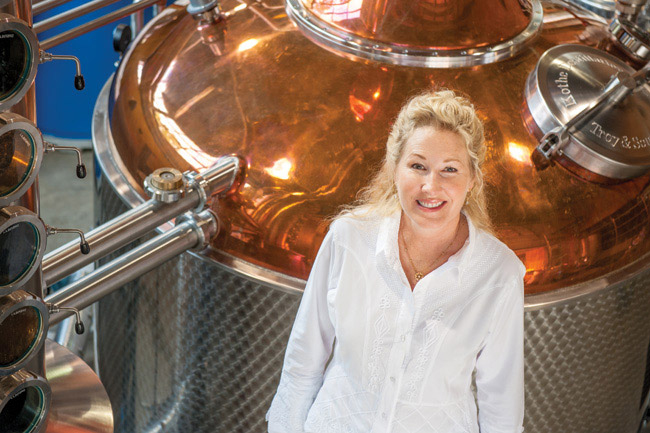
On the Discovery network’s show Moonshiners, whiskey makers stay one step ahead of the law as they tend backwoods stills. Troy Ball is also a moonshiner, but the similarities between her and the Appalachia moonshiners featured on the show are few. Ball’s whiskey is legal and, by all accounts, some of the best on the market.
Ball is also the mother to three sons, two of whom use wheelchairs and are nonverbal. After years of dealing with illnesses brought about by their severe allergies, Ball and her husband, Charlie, moved from Austin, Texas, to a more hospitable climate. They settled on the area around Asheville, N.C.
“We ended up buying some land in the mountains and in the process got to know some of the locals,” Ball says. “Up here, if local people like you, they bring you moonshine. Most of the time it was burning hot to drink and we just stashed it under the stairs.”
Then one day in 2008, a visitor showed up with a different kind of moonshine. It was the “keeper”—the part the moonshiner traditionally saved for himself.
“I tasted that keeper moonshine with a group of women,” Ball says. “I mixed it with fruit juice, and we were shocked at how good it was.”
The next day Ball went to a liquor store and bought all of its white whiskey, most of which was undrinkable. Ball soon realized there was no high-quality, keeper whiskey on the market. That’s when the idea for Troy & Sons Distillers was born.
“This is America’s original spirit; George Washington made white whiskey,” Ball says. “This is our tradition. We shouldn’t be drinking Russian or Mexican cocktails. We should be making cocktails with American spirits.”
After making her first batch in a pressure cooker, Ball went on a quest to find the highest-quality corn she could. Her search led her to John McEntire, whose family has been growing the same white corn since the 1850s. Despite its low yield per acre when compared to modern hybrids, Crooked Creek Corn survived because it tasted better.
“I said to John that he had a lot of corn and that I wanted to make whiskey,” Ball says. “He told me he didn’t want to get arrested. I assured him I didn’t, either.”
Today Troy & Sons can be found in five states, and its reputation is growing. Even more important than the company’s success is Ball’s sons’ health. The two older boys, who weren’t supposed to live past age 10, are now 26 and 24 and living at home while the youngest is in college.
—CINDY THOMSEN